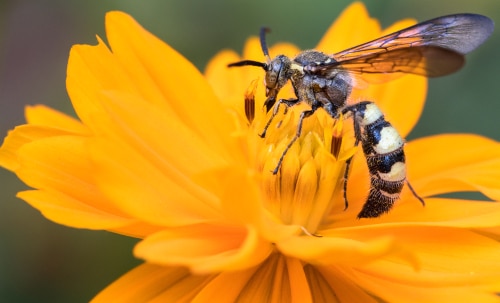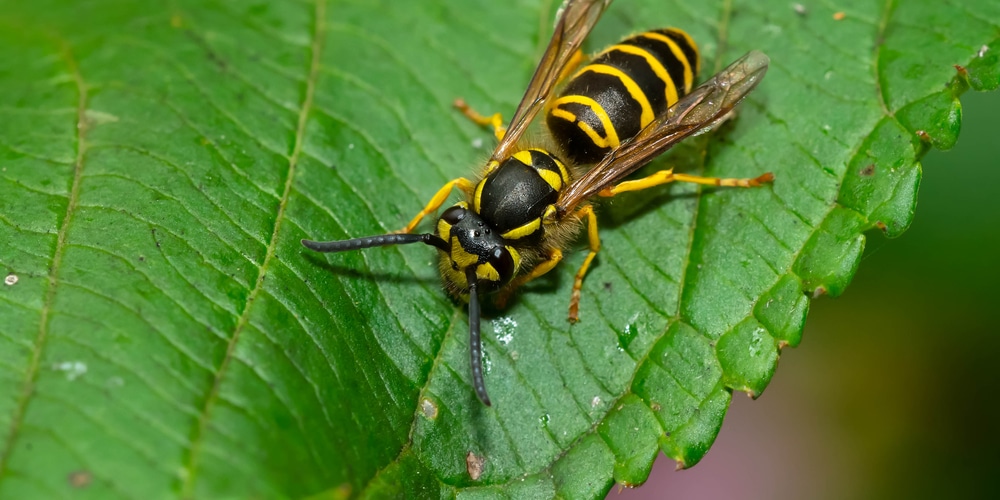As the weather warms, you might spend more time in your garden. And what a nice feeling! Finally, you can enjoy all of your efforts! However, things might be more challenging. Like humans love to spend time in their yards during spring and summers, pests also like to come out when temperatures rise.
If you struggle with pests in your yard, you might be familiar with Yellow Jackets: these brightly-colored wasps enjoy the warm weather and thrive in most parts of the country.
Quick Answer
You might be aware of the fact that bees die after they sting. But that’s not the same with yellow jackets. Indeed, their stinger stays attached to their bodies, allowing these insects to inject their venom multiple times.
These thin wasps are black and yellow with dark wings: you may confuse them with honey bees, but they are less rounded. Plus, these wasps do not make honey and live underground.
Instead, these insects attack honeycomb hives and feed on the honey bees. Encountering them in your garden might ruin your afternoon. If you can, avoid them.
There are different species of yellow wasp: the most aggressive one seems to be the Western Yellow Jacket.
Having them around your yard isn’t a pleasant experience: you can find them in rodent burrows at ground level, but they will also make their nests inside house walls and ceiling cavities if they find somewhere to live on your property.
And because most of them are protective of their houses, removing these insects is a dangerous task. If you are dealing with an invasion, let specialists do the job. You might get hurt! But do yellow jackets die after they sting? And what should you know about controlling their presence in your yard?
Keep reading to find out!
Do Yellow Jackets Die After They Sting?
You might be aware of the fact that bees die after they sting. But that’s not the same with yellow jackets. Indeed, their stinger stays attached to their bodies, allowing these insects to inject their venom multiple times.
A curious fact you may want to know is that only female yellow jackets will sting: males can’t do that. But why do they sting? There are two reasons these insects might get annoyed.
To begin with, female individuals have to protect their nests. When threatened, they will attack the “invader.” Because of their protective behavior, they won’t think twice about attacking whoever approaches their nest (even if only within a few feet). And secondly, you might irritate these pests by interfering with their food source.
The bite isn’t harmful to humans (even if it can get painful), but it might cause an allergic reaction. If you get stung, keep an eye on the affected area. Most of the inflammation should fade away in a couple of days.
Don’t forget to wash the area with soap and water to eliminate most of the venom. Applying an ice pack will reduce the swelling. If you get the symptoms of an allergic reaction, such as vomiting, nausea, or shortness of breath, ensure you call a doctor. Also, if you are stung multiple times, seek medical attention.
Can you Avoid Being Stung?
The truth is that sometimes, getting stung by yellow jackets is unavoidable (and unluck). But you can avoid these pests by staying calm if you notice them around you: flailing your arms will irritate the insects and cause them to sting you various times.
Cover any open food or drinks as these pests will crawl into any food source they can reach. Also, avoid using sweet smells: lotions, perfumes, and certain shampoos will attract yellow jackets.
But can you prevent yellow jackets from invading your lawn? You can take a few steps to do so. Still, if you notice a nest or two, ensure you call a professional service. You might be giving a home to more than one thousand yellow jackets!
Ensure you keep your outdoor garbage bins covered and empty them regularly. These insects love feeding on meats and sweet foods. If you eat outdoors, ensure you properly clean your surfaces.
Leaving scraps of food will encourage yellow jackets to consider your lawn their house. To contain the problem, don’t forget to check your doors and windows from time to time: you want to ensure that all the screens are in place.
Any small hole might allow a yellow jacket to get into your house. And that might not be a pleasant experience at all!
Related Article: Can and Do Grasshoppers Bite?


